
 Flash News
Flash News
Ceno Klosi with over 800 stolen votes, Balluku finds the reason is the tiredness of the counters
"Fast & Furious" in the former Block, police chase an Audi Q8, 4 cars collide
Car hits two tourists on a motorcycle in Fushe Arrëz, one of them dies
Serious accident in Thumanë, one dead, 3 injured
Durrës Court suspends the director of Pre-University Education from duty
Gloomy outlook and passive state / World Bank report on agriculture: Full of potential and a host of problems

Albania, where the dairy sector is struggling with rising costs and declining livestock numbers, has untapped potential in the agricultural production sector, especially tomatoes, which could be a significant source of income for farmers, according to a report. of the World Bank.
The agricultural sector in Albania faces a host of problems. These include inefficient farming methods, distribution issues, low subsidies, rising fertilizer prices, and competition from foreign products. While the country is home to many farms and many fertile lands, its farmers continue to struggle.
But the World Bank report found that Albanians are significantly underestimating many items, including plain tomatoes. Exports from the country go for $ 0.5 (€ 0.48) per kilogram, while Italy exports the same product to the UK at $ 2.4 (€ 2.3) per kilogram.
The report suggests that Albania should consider selling its products in more developed markets such as Western Europe, as Albanian products can compete in terms of international standards.
He also notes that export companies and the agriculture ministry need to work to help with the certification needed to increase farmers' incomes, rather than working at a loss.
Other products identified by the World Bank as potential sources of income for Albanian farmers include fish, nuts, fruits, watermelons and canned olives.
But the outlook is not so rosy for dairy farmers in Albania, who are facing rising demand, rising prices and declining livestock numbers.
Currently, a liter of milk sells for about 131 lek (€ 1.1), significantly higher than in Kosovo (€ 1.01), Serbia (€ 0.86) and Montenegro (€ 0.85). The price is even lower in EU countries like Hungary (€ 0.67) and Poland (€ 0.61), according to data from Numbeo.
Produktet e tjera thelbësore të qumështit si kosi dhe djathi gjithashtu janë rritur ndjeshëm në vlerë gjatë gjashtë muajve të fundit.
Një pjesë e kësaj rritje mund t'i atribuohet rritjes së kostove të lëndëve të para pasi fermat shqiptare importojnë pothuajse gjithçka nga jashtë. Çmimet e ushqimeve për kafshë janë rritur me 50% vetëm këtë vit, kryesisht për shkak të mungesës së drithërave dhe drithërave të shkaktuara nga lufta në Rusi dhe Ukrainë.
Fermerët që nuk subvencionohen nga shteti u është dashur të rrisin çmimin e shitjes me rreth 30%, ndërsa fabrikat kanë rritur kostot e tyre me një ritëm të ngjashëm.
Por ndërsa fermerët shqiptarë kanë vështirësi, importet e produkteve të qumështit nga jashtë janë rritur me 18% gjatë pesë muajve të parë të 2022. Gjatë tre viteve të fundit, kjo është rritur me 27% në përgjithësi, me një vlerë prej 38.8 milionë euro.
Kjo është nxitur kryesisht nga rritja e qumështit të importuar nga Serbia, që përbën 25% të rritjes.
Por edhe krerët e bagëtive po zvogëlohen me shpejtësi përveç problemeve që lidhen me rritjen e kostove dhe konkurrencën me produktet e huaja më të lira. Shumë prona të vogla po mbyllen pasi ato bëhen financiarisht të paqëndrueshme dhe çështje të tilla si emigracioni dhe migrimi i brendshëm drejt qyteteve të mëdha po përkeqësojnë situatën.
The number of cattle in 2020 was 362,583, a decrease of nearly 13% from a year earlier. Goats have also fallen by almost 11 percent. This corresponds to the reduction of accumulated milk in 2020, which fell by about 15%.
Overall, INSTAT data say there has been a 20% reduction in livestock heads in 2021, which is expected to decrease further in 2022.
On June 6, the price of Albanian dairy products increased in all outlets and in all retail outlets. About 55 items rose in price from 10 to 50%, the fourth organized price increase in 2022.
Source: Euroactiv
Latest news





Lufta në Gaza/ Pse Netanyahu do vetëm një armëpushim 60-ditor, jo të përhershëm?
2025-07-02 21:56:08
US suspends some military aid to Ukraine
2025-07-02 21:40:55



Methadone shortage, users return to heroin: We steal to buy it
2025-07-02 20:57:35
Government enters oil market, Rama: New price for consumers
2025-07-02 20:43:30
WHO calls for 50% price hike for tobacco, alcohol and sugary drinks
2025-07-02 20:41:53




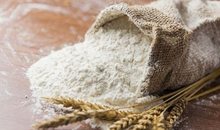


Israel agrees to 60-day ceasefire in Gaza, but many unanswered questions remain
2025-07-02 18:35:27
The weather in Germany is going "crazy", temperatures reach 40°C
2025-07-02 18:22:21

"Fast & Furious" in the former Block, police chase an Audi Q8, 4 cars collide
2025-07-02 17:59:25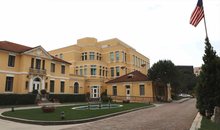
"Birth on a tourist visa? US Embassy warns Albanians: This is prohibited!"
2025-07-02 17:48:16

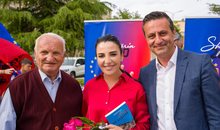
BIRN: Fier recount reveals vote trafficking within open political party lists
2025-07-02 16:57:19

CEO and former director of 'Bankers Petroleum' arrested in Fier
2025-07-02 16:40:42
Car hits two tourists on a motorcycle in Fushe Arrëz, one of them dies
2025-07-02 16:33:23



Fire at the Elbasan Incinerator Landfill, Prosecution Launches Investigations
2025-07-02 15:34:54
What you need to know if you travel to a country with active volcanoes
2025-07-02 15:33:03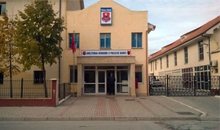


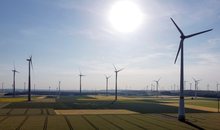
EU proposes 90% reduction in greenhouse gases by 2040
2025-07-02 14:50:23
Europe is burning from the heat / Italy and France are on maximum alert
2025-07-02 14:36:52

Moscow's contradictory statements: Is the friendship with Vučić breaking down?
2025-07-02 14:21:05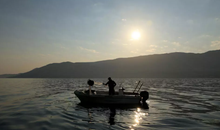
'I lost my battle': Sea warming is killing fishing in Albania
2025-07-02 14:08:35
Sekretet kimike që ndihmojnë në mbajtjen e mjaltit të freskët për kaq gjatë
2025-07-02 14:01:26
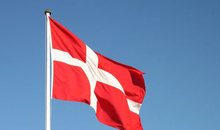
Denmark makes historic decision to make military service mandatory for women
2025-07-02 13:44:33
The appeal of the GJKKO leaves former judge Pajtime Fetahu in prison
2025-07-02 13:30:20
Productivity losses could reduce GDP by 1.3% as a result of extreme heat
2025-07-02 13:21:04
He abused his minor daughter, Zamir Meta is left in prison
2025-07-02 13:04:04

Waste burning in Elbasan, Alizoti: They are poisoning people and stealing money
2025-07-02 12:48:39
Civil disobedience continues in Serbia, dozens of people detained
2025-07-02 12:40:32
Rama's government was born under the sign of garbage and will end like this
2025-07-02 12:28:09
Water prices increase in the municipalities of the Elbasan region
2025-07-02 12:13:38
Civil disobedience continues in Serbia, what is happening in Belgrade?
2025-07-02 12:07:44
Serious accident in Thumanë, one dead, 3 injured
2025-07-02 11:54:42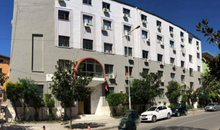
Durrës Court suspends the director of Pre-University Education from duty
2025-07-02 11:49:27
Plenary session on Thursday, what is expected to be discussed
2025-07-02 11:36:43
Europe is burning from heat waves/ What is the 'thermal dome' phenomenon?
2025-07-02 11:26:25
Wanted by Italy for murder, 45-year-old arrested in Vlora
2025-07-02 11:19:31
Fire situation, 28 fires reported in 24 hours, 2 still active
2025-07-02 11:13:20
"Buka" file, preliminary hearing for Ahmetaj postponed to July 17
2025-07-02 11:03:30


Baçi: Belinda Balluku and Ceno Klosi, the most dangerous "gangs" in Fier
2025-07-02 10:32:09
Zamir Meta, suspected of sexually abusing his daughter, arrives in court
2025-07-02 10:21:33

Trump: Israel has agreed to a 60-day ceasefire in Gaza
2025-07-02 10:01:55
Fire continues at Elbasan landfill
2025-07-02 09:51:13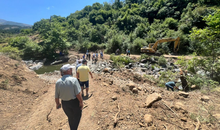

Dates to note during July, important events will occur
2025-07-02 09:31:45
The hearing for Jorgo Goro's claim is postponed
2025-07-02 09:24:19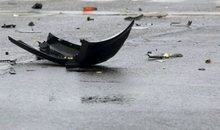

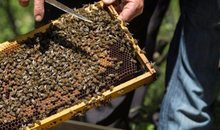

Foreign exchange, the rate at which foreign currencies are sold and bought
2025-07-02 08:42:31
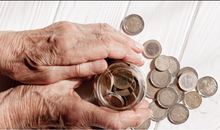
52% of pensioners did not receive full pension in 2024
2025-07-02 08:27:18
Horoscope, what do the stars have in store for you today?
2025-07-02 08:13:36
Hot weather, Wednesday brings high temperatures
2025-07-02 07:59:16
Morning Post/ In 2 lines: What mattered yesterday in Albania
2025-07-02 07:46:15
Heatwave sweeps across Europe, Spain and England record hottest June ever
2025-07-01 22:57:41






Golem and Qerret without water at the peak of the tourist season
2025-07-01 21:09:32

Euractiv: Italy-Albania migrant deal faces biggest legal challenge yet
2025-07-01 20:53:38
BIRN: Brataj and Fevziu victims of a 'deepfake' on Facebook
2025-07-01 20:44:00

Vlora by-pass, work delays and cost increases
2025-07-01 20:24:29



Milan are expected to give up on the transfer of Granit Xhaka
2025-07-01 19:41:25

